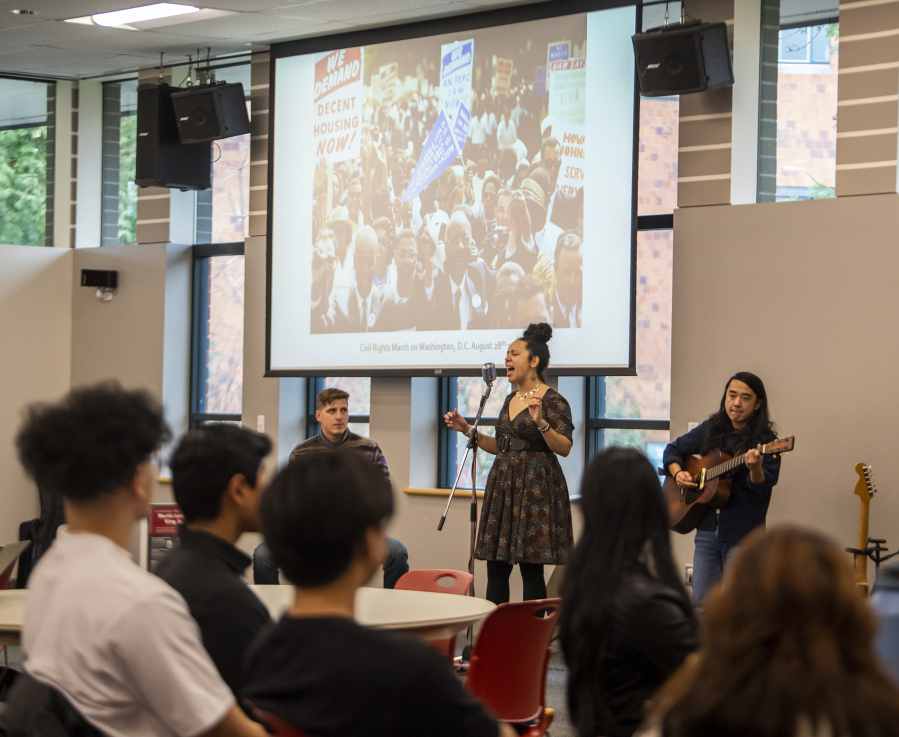Since its inception in 2017, the National Day of Racial Healing has sought to promote productive discussions around race and equity in tandem with the celebration of the Rev. Martin Luther King Jr.’s legacy.
Washington State University recognized the holiday, which was on Tuesday, by holding virtual conversations with school leaders and educators about what progress and healing in America looks like.
On the Vancouver campus, the daylong series culminated with a performance and discussion with Portland-based activist and musician Chrissy Wood, who was a prominent leader in the May 2020 protests that followed the murder of George Floyd. Just as she had done in leading the protests, Wood focused on helping students identify and discuss solutions and share what “healing” means and looks like for everyone.
College students, she said, are a perfect group for these kinds of discussions.
“It might be a particularly optimistic audience,” Wood said. “There’s an eagerness to promote change. You all have a unique opportunity.”
Finding a voice in change
WSU Vancouver’s Center for Intercultural Learning and Affirmation invited Wood and her group, Wren the Band, to perform in the school’s student commons on Tuesday because of their ties to the community and commitment to positive messaging in their activism. The band, led by Wood’s vocals, formed in 2018 and focuses on “soul-funk,” with much of their music exploring themes of identity, equity and social justice.
Following a performance of a half-dozen songs, Wood pivoted from singing to telling her personal story as a recently turned activist leader in the 2020 George Floyd protests in downtown Portland. She credits Ta-Nehisi Coates’ “Between the World and Me” as a piece of literature that nudged her in the direction of activism by helping to create a book club dedicated to reading similar books that discuss inequality and race relations in the United States.
“I thought, ‘Oh, this puts words behind my experience,’ ” Wood said of Coates’ book.
When the May 2020 protests began in Portland, Wood said organizers were searching the crowd for a Black woman to speak: “We need to hear from you all,” they said. After a few days of returning to protests and being asked to sing, Wood found herself in front of a crowd of 6,000 at the Portland Waterfront — what would be her first large-scale performance ever.
That moment, prefaced by months of self-educating in her reading group and elsewhere, helped Wood embark on somewhat of a personal renaissance as a voice of change.
On Tuesday, Wood asked WSU Vancouver students directly what “healing” means to them. Some said “self-care” — detailing examples of personal solaces like having the confidence to politely deny an invitation, drawing a bubble bath or reading. The discussion soon evolved into an evaluation of how people can find solutions to issues of personal pain or frustration.
Wood continued by asking students to name examples of larger global issues they’d want to see addressed in their lifetimes or beyond: things like housing for all, a reversal of the U.S. Supreme Court’s Citizens United decision, and accessible clean water. In opening up discussions focused on solutions rather than arguing, Wood said she is able to keep people focused on progressing together.
As hubs of learning and young voices, universities have a unique opportunity and responsibility to show commitment to equity and diversity in doing more than just hosting events like that on Tuesday, Wood said.
“Hold space for these voices and these discussions year-round, not just a day or week,” she said. “Put your money where your mouth is. (Schools can) hire more faculty of color, give out more scholarships, do things like have professors of color teach economics. Make change from the top down.”
Ongoing equity work
The performance and discussions across campus on Tuesday are pieces of WSU Vancouver’s efforts to consider equity work in more facets of their operation going forward. While much of that is expected to be done at an administrative level, in-school organizations like the Center for Intercultural Learning and Affirmation are working to install more events like Tuesday’s to foster more student engagement in equity work.
“One of the biggest messages we’re hoping to spread is that we want people to understand that there is a community that people can be involved in,” said Faafetai Brown, a WSU Vancouver student and outreach and retention leader for CILA. “This event is focused on healing and how to serve the community — it’s understandable that a lot of people feel alone, especially those who don’t get the same opportunities and resources as others.”
Brown first got involved with CILA after she was nominated for the center’s THRIVE program, which helps get first-generation students comfortable at the school by going on group retreats and participating in leadership workshops. After feeling inspired by the group’s sense of community, she began helping recruit students to get involved and plan more future events that hold space for historically marginalized communities and voices of color.
“This is the first step in such a huge plan,” Brown said. “Our student demographic has really been changing over the years, we’re hoping this could be the first step in getting these students in the community to start networking. We hope this event can show that CILA is a safe space they can go to.”




